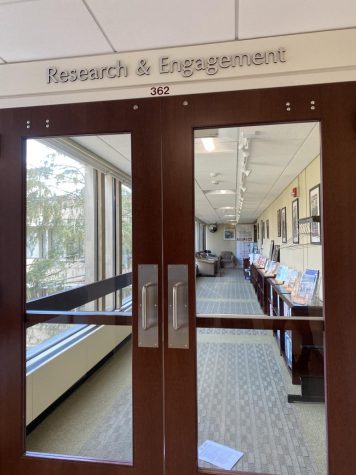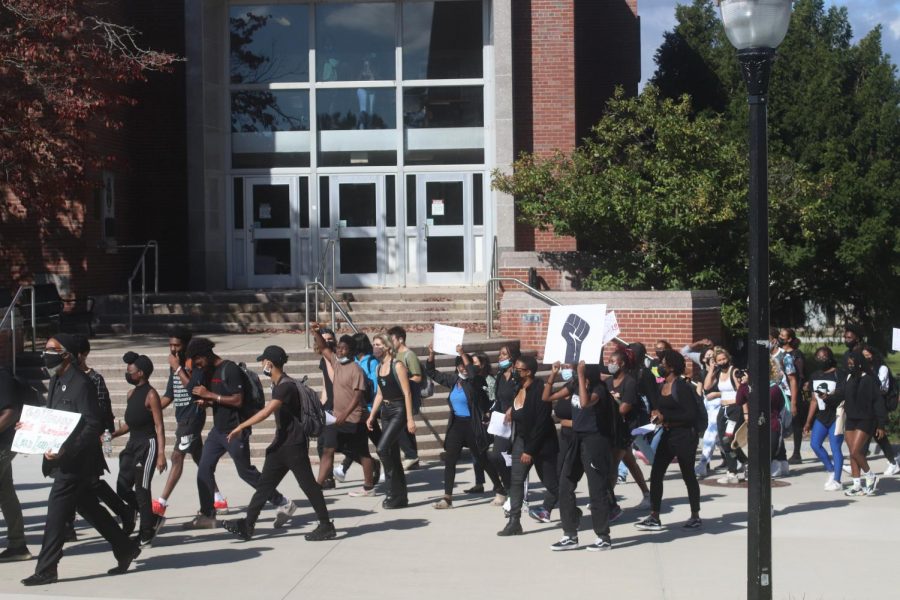Students gathered on Thursday afternoon for the “‘Be Revolutionary’ March” to express their grievances over recent racist incidents on campus and the administration’s response to them. Organized by the University of Massachusetts chapter of the National Association for the Advancement of Colored People, the march served to share student experiences of racial injustice and peacefully demand change.
The crowd, composed of more than 100 students, made their way from the Student Union to the Whitmore Administration Building, where they distributed fliers with a list of demands to the offices of various administrators, including that of Chancellor Kumble Subbaswamy.
“We are here to provide a sense of community, belonging and safety for Black [students] and people of color on campus. We are here to be revolutionary,” said Dele Osinubi, the registered student organization liaison for the UMass NAACP.
Osinubi, a junior biology major, led chants as the group made its way to the Whitmore. Some onlookers recorded as the group walked through campus, while some expressed solidarity with raised fists.
Tina Noel, the president of the UMass NAACP and a senior biology major, emphasized the importance of organizing in pressuring administrators to take action when racist incidents happen.
“The failure to call out these attacks when they happen, not when they go viral, allows for racists to feel secure in their hate while Black students are continuously left feeling unsafe and unwelcome at this institution,” she said to the crowd.
The UMass NAACP distributed a list of demands to the participants before reading them out to the group. The 14 demands included but were not limited to: a formal public apology from administrators for “failure to respond” when racist emails were sent to Black organizations early in the fall semester, providing students with opportunities to be involved in the process of stopping “systemic racism and hate,” urging racial and unconscious bias training during new student orientation, and increasing funding and support for Black Registered Student Organizations.
The list also called for allowing the use of an outside caterer to provide students with authentic cultural food in its fourteenth demand. “We deserve to have a true representation of our culture at UMass,” the final point concluded.
Upon arrival at Whitmore, the crowd split into two groups, one making its way into the building while the other remained outside. Those inside the building were urged to keep quiet and respectful by organizers of the march.
Filing through the halls, the students stopped at multiple offices to leave copies of their demands with the administration. They were met with locked doors at their first stop, the Vice Chancellor for Research and Engagement office. Before moving to the next office, a copy of the demands was slipped under the door.
“We wanted it to be peaceful, we were quiet. We even told them about it,” Noel said. “But they still decided to lock their door, which was a sign of disrespect, a sign that they didn’t really take us seriously.”

The group made its way to the Office of Student Affairs and Campus Life, where the students asked Vice Chancellor Brandi Hephner LaBanc to accept the list of demands. LaBanc accepted their flier and thanked the students for their advocacy.
Students were met with resistance in trying to leave a copy of their flier at the Office of Equity and Inclusion and the Office of University Relations. Later, at the office of the Provost and Chancellor, the Chancellor’s chief of staff Rolanda Burney accepted the list of demands from Noel.
Meanwhile, chants continued outside of Whitmore, and a few individuals shared personal experiences with racism on campus. Tyler Pina, a senior natural resource conservation major, shared an incident in which a student approached him with the assumption that he was an athlete at the University, asking him what sport he played.
“I told him ‘environmental science,’ I got here on academics. I’m not just defined by my physical abilities,” Pina said to the crowd before being met with applause.
“We are here to stay and we are unapologetically Black and brown,”said Tunji Emuleomo, a sophomore psychology major, explaining what he hopes the community takes away from the march. Emuleomo also shared a moment with the crowd in which individuals yelled a racial slur at him from a car.
Osinubi emphasized the importance of sharing personal experiences at events like this one to create understanding. “You can’t gain cultural awareness without a dialogue, and a lot of people are too afraid to talk about it,” Osinubi said.
The UMass NAACP was accompanied at the march by other Black student organizations, including the Black Student Union, the Haitian American Student Association and the Cape Verdean Student Association.
Before the march began, organizers encouraged participants to spread the word via social media and share their experiences of racism on campus through their Instagram story. They also passed out the University Rules and Regulations regarding students’ right to protest and demonstrate.
Amilcar Shabazz, a professor in the W. E. B. Du Bois Department of Afro-American Studies and the faculty advisor of the UMass chapter of the NAACP, addressed the gathering of students before the march began.
“If you don’t stir the pot, if you don’t make some noise — if you don’t agitate, educate, organize — your issue goes nowhere, your concerns go nowhere,” he said through a megaphone.
Shabazz, a longtime member of the NAACP himself, praised the organizers of the march.
“[I] love them, [I] love that their response to a lot of negative things, negative attention, [and] negative incidents is to turn to each other rather than on each other. [I] very much admire the students for that,” he said.
Organizers thanked attendees for their participation in the march outside of the Whitmore building, concluding the gathering. Noel encouraged students to follow the UMass NAACP on Instagram to remain informed on future events.
“We’re going to keep having more events. I hope more people will show up, and I hope that we will eventually be heard by the UMass administration,” she said.
Sara Abdelouahed can be reached at [email protected]. Follow her on Twitter @AbdelouahedSara.Saliha Bayrak can be reached at [email protected]. Follow her on Twitter @salihabayrak_.





















Bill Chumley • Oct 15, 2021 at 1:57 pm
Looking forward to clear communication on the findings of the cyber investigation.